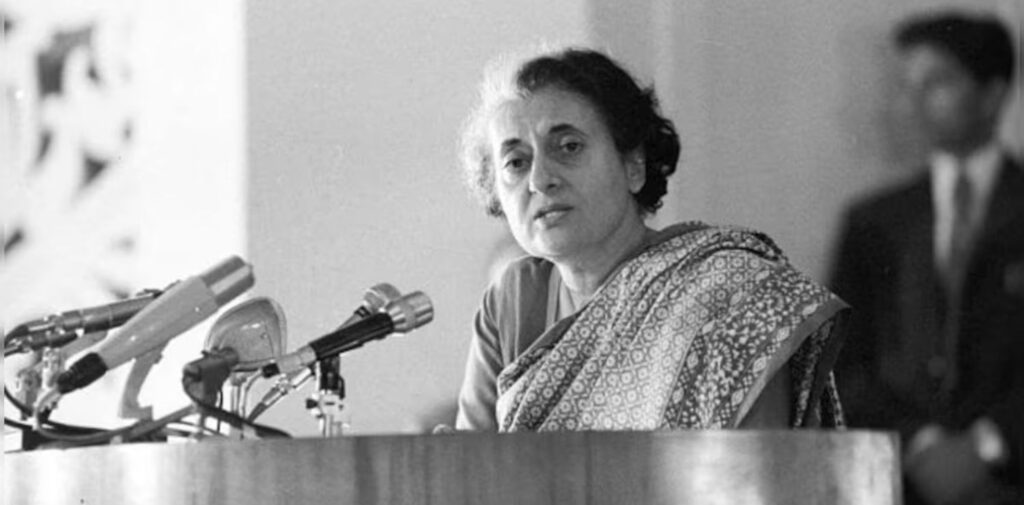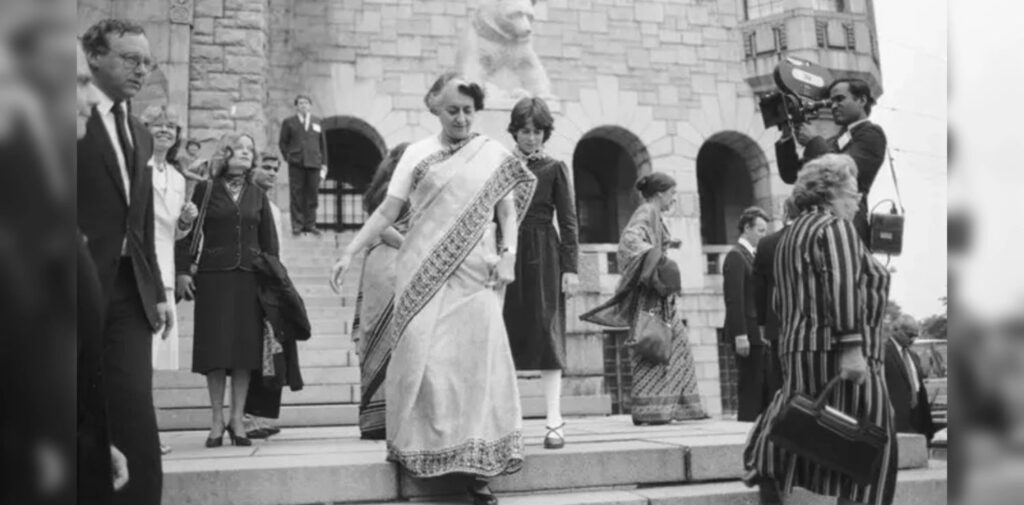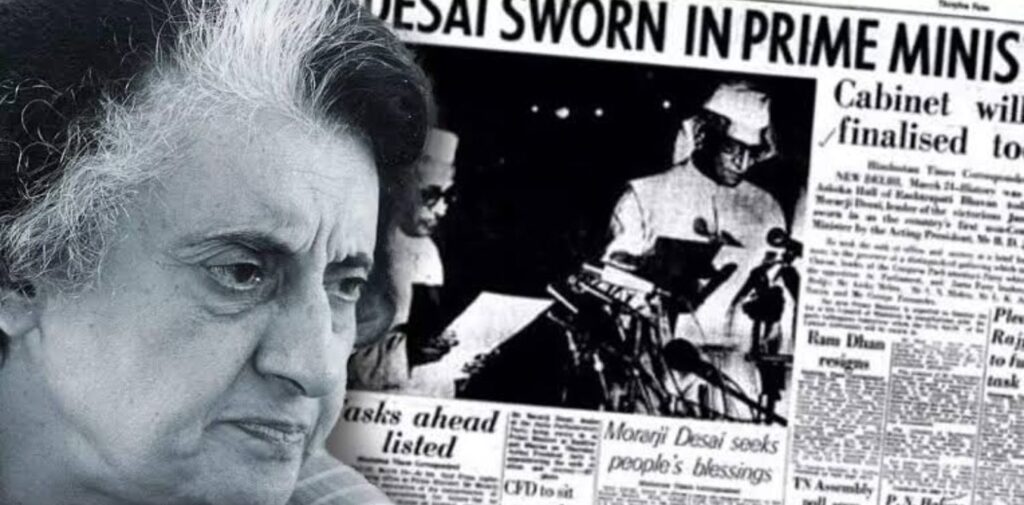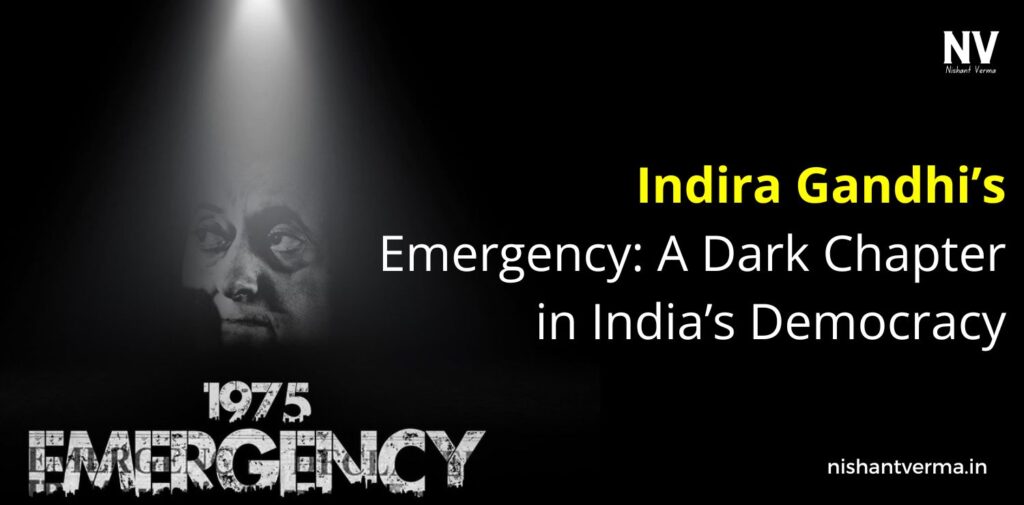In the history of independent India, June 25, 1975, marks a black day that many remember as the day democracy was jailed. On this day, Prime Minister’s Indira Gandhi emergency, a decision that not only throttled the voices of over 100 crore Indians but also tarnished the image of India’s democratic setup. The Emergency, which lasted for 21 long months, was a blatant misuse of power, done purely for personal gain and to satisfy the ego of one individual—Indira Gandhi.
Why Did Indira Gandhi Impose the Emergency?
The backdrop of the Emergency lies in a series of events that led to Indira Gandhi’s deteriorating popularity. The main reason was the verdict of the Allahabad High Court, which found her guilty of electoral malpractices in the 1971 elections. Justice Jagmohanlal Sinha ruled that she had used government machinery for her election campaign. This decision effectively disqualified her from holding public office, but instead of resigning gracefully, she resorted to a much darker move—declaring an Emergency.

The Verdict That Triggered It All
Indira Gandhi’s reputation and hold over the Congress party were on shaky ground after the court’s verdict. Opposition leaders led by Jayaprakash Narayan (JP) demanded her resignation and launched a series of protests. The momentum against her was gaining strength, and the fear of losing power gripped her.
The Role of Political Instability
By the mid-1970s, India was already dealing with a range of issues—rising unemployment, soaring inflation, food scarcity, and social unrest. Political instability was at its peak. Protests and strikes were rampant, especially in Gujarat and Bihar. The country was on the brink of chaos, but instead of addressing these problems, Indira Gandhi focused on preserving her own political career.
Declaring the Emergency: A Move to Crush Dissent
On the night of June 25, 1975, Indira Gandhi advised President Fakhruddin Ali Ahmed to declare a state of Emergency under Article 352 of the Indian Constitution, citing internal disturbances. The decision was made without consulting her Cabinet. Overnight, opposition leaders, activists, and dissenting voices were arrested. Press censorship was imposed, and civil liberties were suspended.
This move gave her absolute control over the country. It allowed her to rule by decree, unchallenged by any political opposition or public outcry. The Parliament became a puppet show, and the judiciary was rendered powerless.

Human Rights Violations and Authoritarian Control
The Emergency was marked by gross human rights violations. Prominent leaders like Jayaprakash Narayan, Morarji Desai, Atal Bihari Vajpayee, and L.K. Advani were thrown into jail. Thousands of other political opponents were also arrested and detained without trial. The infamous MISA (Maintenance of Internal Security Act) was used liberally to suppress dissent.
But the worst was yet to come. Indira Gandhi’s younger son, Sanjay Gandhi, who had no constitutional authority, became the de facto ruler. His five-point program, which included forced sterilization and slum clearance, wreaked havoc on the lives of ordinary citizens. Men were forcibly sterilized under the pretext of population control, and slums were demolished with little regard for the displaced poor.
The Role of the Congress Party: Complicit in Suppression
The Congress Party, under Indira’s leadership, became a tool for personal vendetta and political gain. Congressmen, instead of standing up against the unjust regime, chose to be complicit. They indulged in sycophancy and supported decisions that humiliated the country. The party that had once fought for India’s independence now became a symbol of tyranny.
How India Suffered Under Emergency: Democracy Gagged
During the Emergency, the Constitution was amended several times to legitimize the government’s actions. The 42nd Amendment, in particular, curtailed the powers of the judiciary and centralized more authority in the hands of the executive. Newspapers were not allowed to publish any news without prior government approval. The press was reduced to printing government propaganda, and editors who defied the orders were jailed.
Educational institutions, too, were not spared. Professors and teachers who spoke against the regime were dismissed. The atmosphere was filled with fear, and even a murmur against the government could land someone in jail.
The 1977 Elections: People’s Verdict Against Dictatorship
By 1977, Indira Gandhi, confident of her hold over the nation, decided to lift the Emergency and call for elections. But she underestimated the wrath of the people. In the 1977 elections, the Congress party faced a crushing defeat. The Janata Party, formed by a coalition of opposition parties, won a landslide victory. Indira Gandhi herself lost her seat, which was a clear indication of how the nation viewed her authoritarian rule.

The Aftermath: A Stained Legacy
The Emergency left a permanent scar on India’s democratic fabric. It showed how one person’s hunger for power can dismantle an entire system. The Congress Party, under Indira Gandhi’s leadership, lost its moral high ground. The very party that once led India to freedom became synonymous with dictatorship and oppression.
Indira Gandhi tried to justify her actions by citing national interest, but history remembers her as a leader who put her personal interest above the country’s welfare. Her decision to impose the Emergency was not just a mistake; it was a deliberate attempt to cling to power by crushing democracy.
A Lesson for Future Generations
The Emergency serves as a lesson for future generations on the dangers of absolute power and the importance of safeguarding democratic institutions. It teaches us to be vigilant and to never let one individual or party become so powerful that they can subvert the Constitution and trample upon the rights of the people.
The misuse of power by Indira Gandhi and the Congress party during the Emergency should never be forgotten. It is a stark reminder of how easily democracy can turn into dictatorship if the checks and balances of power are weakened.
Conclusion: Indira Gandhi Emergency—A Blot on India’s Democracy
Indira Gandhi’s decision to impose the Emergency was driven purely by self-interest. It was a desperate attempt to stay in power, and for that, she was willing to sacrifice the principles of democracy and the freedom of millions. Her actions during the Emergency will forever be remembered as a dark period in India’s history, a period when one woman’s ego led to the suffering of an entire nation. The Emergency was not just a political move; it was a betrayal of the trust of 100 crore Indians who believed in the values of democracy, justice, and liberty.




